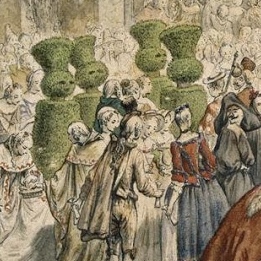Never himself a King
The Grand Dauphin was allegedly told that his destiny would be to be "the son of a King, the father of a King but never himself a King."
Naturally, the first part was already secured so that is an easy point in favour of superstition. However, the Grand Dauphin as still a child when this prophecy was made which meant that whoever said it - if anyone did, that is - they could not have foreseen the dramatic events in the latter part of the 17th century. In 1700 the King of Spain died without a direct heir which meant that there were two contenders for the throne: the Grand Dauphin and the Austrian Archduke Charles. As heir to the French throne the Grand Dauphin was not permitted by the remaining European powers to sit on both thrones but his own son could. Luckily, he had three and the second were chosen to become King of Spain (the eldest were - of course to remain to ensure the French line of succession). Eventually, the War of the Spanish Succession ended with the Duc d'Anjou becoming Philip V of Spain and his father thus becoming "father of a King".
 |
| The Grand Dauphin |
In 1711 the Grand Dauphin was already in his forties and it seemed as if his father would live forever. The King preferred his grandson and his wife, the Duc and Duchesse de Bourgogne, and treated the Duc more like his direct heir than his son. The Grand Dauphin seemed to have resigned himself to his fate and had removed himself to his private estate of Meudon. Here he died of small-pox on 14 April thus fulfilling the prophecy.
The cut mirror
When Marie Antoinette arrived at the French court as a young Dauphine it seemed as if a splendid destiny awaited her. She reviewed her apartments which had been left without an inhabitant since the death of Marie Leczinska. When she got to her small inner cabinet - later nick-named the Cabinet de la Meridienne since the then Queen would spent her midday hours there - she noticed that one of the mirrors behind the sofa in a cozy nook had an odd defect. The way it was cut and the particular spot where the Dauphine stood made it look as if her head had been cut off.
 |
| The mirror |
A short life
The vivacious Marie Adelaide of Savoy captivated the French court and especially Louis XIV when she came to Versailles to marry the Duc de Bourgogne. She was indulged in her every whim but there was one creepy prophecy that could dampen the spirit of even Marie Adelaide. It had once been prophesied by an astrologer in Turin laying her horoscope that she would die in her twenty-seventh year. This year was 1712 and there is something to suggest that the then Dauphine herself felt a little uneasy about what her ladies-in-waiting tried to make light of.
| Marie Adelaide as Duchesse de Bourgogne |
Such an attempt was made in January 1712 when her lady-in-waiting jokingly reminded Marie Adelaide - who was in her absolute prime - about the saying. Marie Adelaide became somewhat pensive and said: "Well, I must make haste. I cannot enjoy myself too much for I shall die this year".
Less than a month later she was dead.
The heart of a King
Jeanne Antoinette Poisson was not born into nobility and during her childhood she received her education partly from her mother's hands and partly from a convent. At the age of 8 years old Jeanne's mother had taken her to soothsayer who had predicted that she would "win the heart of a King".
 |
| Detail of an illustration of the ball - the King was dressed as one of the yew trees |
From then on her mother - who firmly believed it - took care to do all she could to bring her daughter closer to the King, Louis XV. The couple's official first meeting took place on 25th February 1745 during the wedding celebrations of the Dauphin. The occasion was the masked ball later known as the Ball of the Yew Trees which sparked the relationship between Louis XV, King of France and Madame de Pompadour.

No comments:
Post a Comment